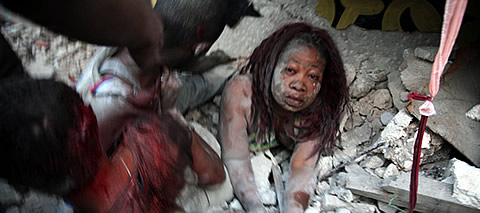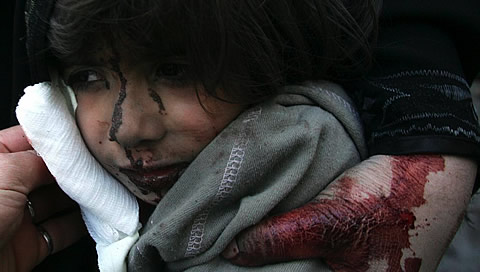Posted January 20, 2010
by Kim Redigan
[Kim Redigan is a member of Michigan Peace Team and participated in MPT’s delegation on the Gaza Freedom March in December. An interview on her experiences on the March will appear in the March-April issue of Against the Current.]
How to write about the Gaza Freedom March at a time like this?
Exactly one week after our return from Cairo, Haiti is flattened by an earthquake that may have claimed tens of thousands of lives. As I sat down at my computer early yesterday evening to finally cobble together a reflection on Egypt, the news flashed across the screen that Haiti – still punch drunk from destructive hurricanes just over a year ago – had once again been knocked down. Tonight the pictures in my mind are as tangled as the homes that lie twisted in the dusty streets of Haiti and Gaza City.

As images of ramshackle structures, capriciously tossed like tinker toys in the streets of Port-au-Prince, began to appear in the media and the faces of men, women, and children that I had met in Haiti last June began to flash across my mind, I felt shocked, sickened, and angry. Shocked that Haiti was yet again being battered by a vicious natural disaster, sickened by my own inability to respond to this magnitude of suffering in any meaningful or helpful way, and angry that it takes a disaster of biblical proportions to get water and food and medicine to people who go without these basic necessities as a matter of course. As the song goes, when will we ever learn?
While looking at the horrific scenes of Haitian corpses and frantic family members clawing through the rubble of collapsed homes in search of loved ones, I had the eerie feeling of having seen these pictures before. While the mind wants to compartmentalize the suffering of the world and organize it in a neat hierarchy based on body counts and statistics, the heart screams “No!” These little ones buried under fallen buildings in Haiti are the same little ones reaching out of the rubble in the Gaza Strip. Afghanistan. Iraq. Whether the earth shakes under their feet as a result of a shifting fault line or bombs being dropped by Israeli fighter jets and U.S. drones, the children are always the first to suffer. Their suffering bears heart-wrenching witness against a world that has forgotten what it means to be human.
The images are so familiar. A mother, arms raised to the skies, mouth frozen in a silent scream. The dazed, earnest eyes of young men carrying the wounded on their backs. The single shoe. The random toy. The blood-soaked sheets. No, there is no hierarchy of suffering. From Haiti to Hebron, from Cairo to Carrefour, there are real and damning consequences that result from our dance with the forces of death.

Often there are terrible ironies and disturbing synchronicities that accompany tragedies such as these. Last year, Operation Cast Lead was unleashed on the people of Gaza just in time to dovetail with the Feast of the Holy Innocents. Today, while Haitians stack their dead on the side of the road, rich and powerful men from Goldman Sachs, Morgan Stanley, JP Morgan Chase, and Bank of America equivocated in their testimony before a Bipartisan Commission. On a day when a bottle of water and a clean bandage may be the only things standing between life and death for the people of Haiti, billionaires justify extravagant bonuses for themselves.
Another news story today claims that President Obama will be asking for an additional $33 billion for the wars in Iraq and Afghanistan in addition to the $708 billion slated for the Defense Department. How much of this money could feed the hungry and clothe the naked in Haiti? How much of it will be spent on weapons that will be used against the children of Gaza and other places around the world? While the children of Gaza shiver this winter under the cruelties imposed by the siege and the children of Haiti hunger for a piece of bread, the war machine rolls on and the rich build bigger barns for themselves.
While the outpouring of support for Haiti in this time of crisis is heartening, how much better it would have been served by justice earlier rather than compassion later. After reading the grim news of the day and taking in the discordant images of broken bodies in Haiti and rich bankers in Washington, I was stopped in my tracks by a short twitter that someone sent out this afternoon. The message said that we need to give up “preemptive war” and practice preemptive humanitarianism — preemptive justice — preemptive peace.
While earthquakes, hurricanes, and other natural disasters are out of our control, the horror that is unfolding in Haiti might have been greatly reduced had the world community acted preemptively in solidarity with Haiti, a country that lacks the infrastructure necessary to survive the natural disasters that so often have their way with this small, vulnerable nation. How much suffering might have been averted by resources and people mobilized earlier to help Haitians fund the construction of dwellings designed to withstand natural disasters, medical clinics to treat the injured, and wells to provide drinking water to the people?
What if a fraction of the money spent to bail out the banks had been spent to build up the infrastructure of Haiti? It should be noted that this is not a matter of charity, but rather, of justice since the U.S. has been among the nations that have historically exploited and occupied Haiti throughout its history.
Likewise, what if we were to take the billions slated for war and use it for preemptive peace in the Middle East, especially in Palestine where so many of our tax dollars are spent on weapons and walls?
As we gathered in Cairo for the Gaza Freedom March, it felt like too little, too late. We were blocked from entering Gaza, so we spent our time on the streets of Cairo where we vigiled, demonstrated, and fasted. Those among us who had been to Gaza before the siege carried memories of friends and family with whom they longed to reconnect; the rest of us had to rely on the pictures that by now are all too familiar: the small hand reaching out of the rubble, the mother’s scream, the random toy.
Tonight I stare at similar pictures taken in the streets of Port-au-Prince and ask myself, when will we ever learn? While the bodies pile up, the children of Haiti and Gaza wait for an answer.

Comments
One response to “A Meditation on Gaza and Haiti: When Will We Ever Learn?”
I am afraid that we will never learn despite our ability to have compassion. How many times do we have to say “Never again” when it is already too late?
Images of coffins coming back from wars, images of broken bodies in Haiti or anywhere else in the world bring tears in our eyes ad outrage in our hearts but for how long? We then build shrines in the “Memory of…” and we mark a date in a calendar.
Does this mean that we all have blood in our hands?
Perhaps yes, as we seem to trust those we put in power and we better start not to trust them at all.
Justice means accountability and we are not even able to come to this until it is too late,or even never.